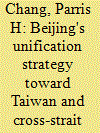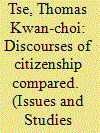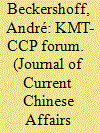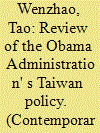|
|
|
Sort Order |
|
|
|
Items / Page
|
|
|
|
|
|
|
| Srl | Item |
| 1 |
ID:
134077


|
|
|
|
|
| Publication |
2014.
|
| Summary/Abstract |
For almost a decade, Beijing has pursued a "soft" approach toward Taiwan, cultivating economic ties and political exchanges in its pursuit of reunification. Following the end of President Chen Shui-bian's term in office, which was marked by constant tensions and several crises with China, Beijing has colluded with his successor, Ma Ying-jeou to pursue a policy of economic integration with the mainland. Beijing's
strategy toward Taiwan under Chairman Xi Jinping and his predecessor Hu Jintao has yielded positive results. The approach not only avoids possible military conflict with the United States, but receives support from Washington. Beijing's economic means, such as the Economic Cooperation Framework Agreement (ECFA), have enhanced Taiwan's economic integration with China and greatly increased the
PRC's control over Taiwan's economy and society, helping to lock Taiwan into the mainland's orbit. Likewise, Beijing has developed tools that allow it to intervene directly in Taiwanese domestic politics. However, efforts to use ties with President Ma to bring Taiwan farther into the PRC orbit have backfired, resulting in a weakened presidency that cannot deliver Beijing's goals. Thus, Beijing appears to be looking ahead to the next two elections, trying to make as much progress as possible before Ma leaves office, while simultaneously trying to establish ties with possible successors and the opposition DPP. In 2012, Beijing's intervention assisted the reelection of President Ma. It is sure to try again in Taipei's mayoral election in 2014 and the presidential/parliamentary elections in 2016.
|
|
|
|
|
|
|
|
|
|
|
|
|
|
|
|
| 2 |
ID:
130633


|
|
|
|
|
| Publication |
2014.
|
| Summary/Abstract |
Configurations of citizenship are often reflected in school knowledge which contains normative and pedagogical discourses. Changes in the citizenship curriculum also capture the socio-political transition of a society. Drawing on textual and content analysis, this article presents a comparative analysis of the relevant textbooks at the junior high level in Mainland China and Taiwan in the late 1990s with regard to the portrait of a good citizen. It is concluded that the mainland's materials, combining socialist and republican models of citizenship, tend to teach their students to be patriots with good psychological quality, legal compliance, moral integrity, lofty ideals, an enterprising spirit and a distinguished sense of social responsibility for "socialist modernization construction" and national revival, while Taiwan's materials, more in a manner of liberalism and communitarianism, emphasize personhood, human rights values, public spiritedness, and civic competence, which lay a foundation .for sustaining a budding democracy and civil society
|
|
|
|
|
|
|
|
|
|
|
|
|
|
|
|
| 3 |
ID:
130293


|
|
|
|
|
| Publication |
2014.
|
| Summary/Abstract |
The recent rapprochement between China and Taiwan cannot be understood if our conceptual apparatus is unable to cope with the distinctive new quality of cross-Strait relations. A critical framework provides a transnational account of cross-Strait dynamics. An analysis of the KMT-CCP Forum through the lens of the neo-Gramscian notion of hegemony sheds light on the Forum's strategies, mechanisms, practices and instruments to secure consent for cross-Strait rapprochement. While this mode of governance has broadened the KMT's strategic options, it has also compromised Taiwanese democracy.
|
|
|
|
|
|
|
|
|
|
|
|
|
|
|
|
| 4 |
ID:
130611


|
|
|
|
|
| Publication |
2014.
|
| Summary/Abstract |
Since May 2008, relations across the Taiwan Strait have experienced a Historical turning point. The two sides of the strait have tided over a "high-risk" period and embarked upon a path of peaceful development and benign interaction. When the Obama administration came to power in January 2009, the new situation in cross-straits relations had already taken hold. By then, the US. was busy coping with a series of challenges both at home and abroad, including tackling the ?nancial crisis and seeking to end the two wars in Iraq and Afghanistan. So, it can be said that the Taiwan issue was neither a priority in Obama's foreign strategy, and that he did not expend as much energy on it as his predecessor.
|
|
|
|
|
|
|
|
|
|
|
|
|
|
|
|
|
|
|
|
|